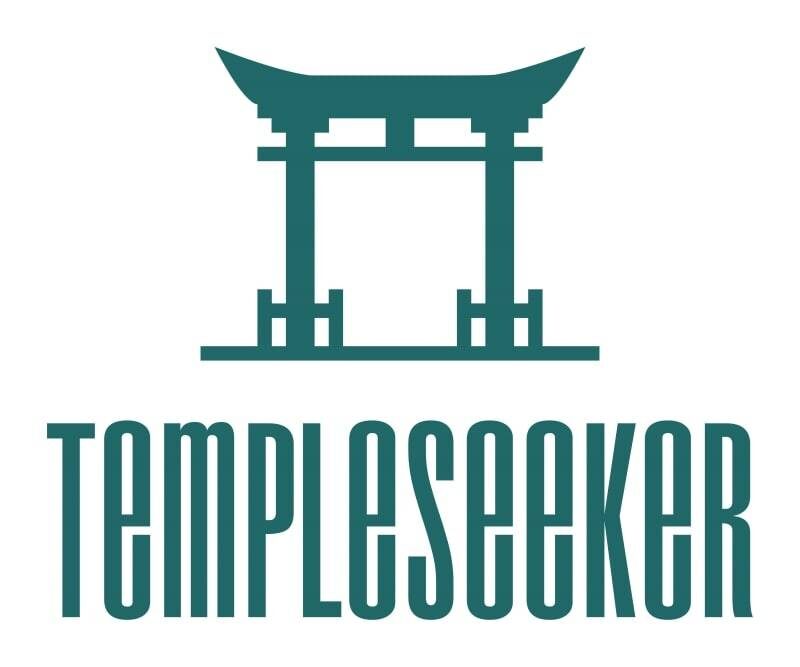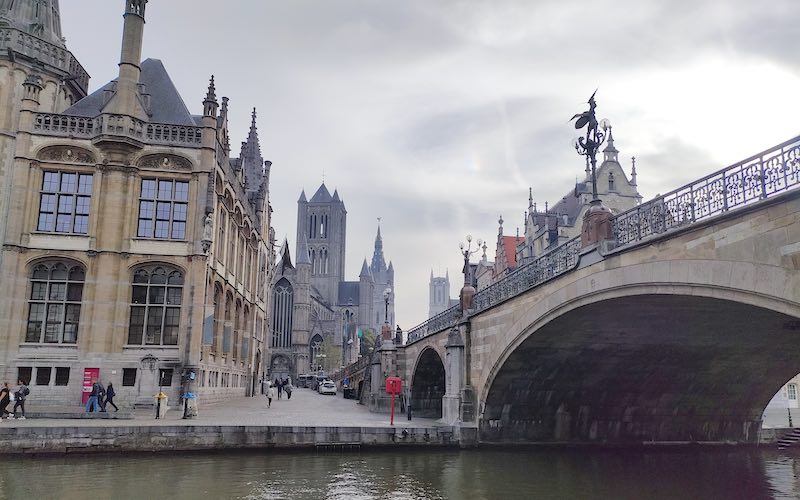I’ve just got to Brussels after two days in Bruges and two days in Ghent, and I’m absolutely loving Belgium! Lot’s of people are asking me ‘Is Ghent worth visiting?’ and I can tell you that it absolutely is. Yes, I went to Ghent and loved it! Bruges was like being lost in a fairytale, but Ghent just blew me away!
Disclosure: templeseeker.com is a participant in the Amazon Services LLC Associates Program and other affiliate advertising programs designed to provide a means for us to earn fees by linking to Amazon.co.uk, Get your Guide and other affiliated sites. Affiliate links may be used in this article on ‘Is Ghent worth Visiting?, but they do not impact on the price that you pay and they do help me to get this information to you for free.
Ghent’s Golden Age
At the height of Belgium’s golden age, Ghent was the largest city in Europe, second only to Paris. It was built on the confluence of two rivers, which meant that food and building materials could easily come in on boats due to its prime location. During the Middle-Ages, grains were taxed at 25% as they passed through from France, contributing highly to the wealth of the city. The result of this affluence is 12th-15th Century architecture that will blow your mind!
Disclosure: templeseeker.com is a participant in the Amazon Services LLC Associates Program and other affiliate advertising programs designed to provide a means for us to earn fees by linking to Amazon.co.uk, Get your Guide and other affiliated sites. Affiliate links may be used in this article on ‘Is Ghent worth visiting?’, but they do not impact on the price that you pay and they do help me to get this information to you for free.
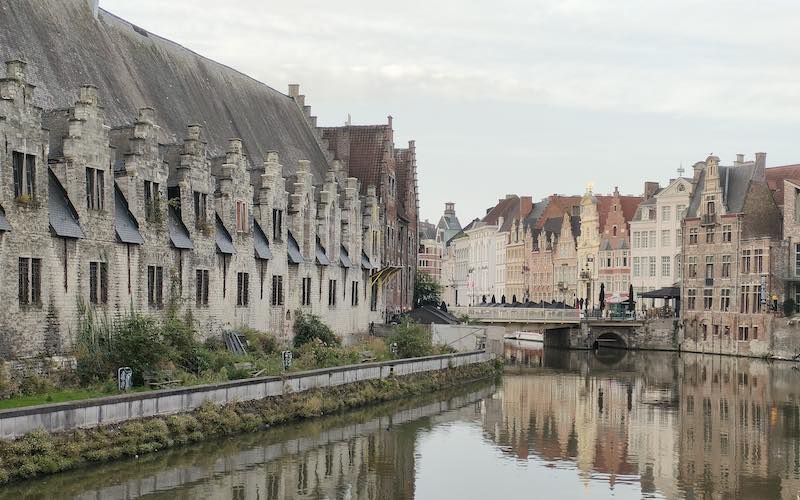
Photography copyright: All the images in this blog are original photography by Amy Green and are property of @templeseeker (unless otherwise stated). Please do not use these without permission or without giving credit. If you would like to use any of these images please email: amy@templeseeker.com for permission.
Is Ghent worth visiting?
As well as the influx of wealth in the Middle Ages, Ghent also has a vibrant student population. So, in Ghent you have this fantastic combination of medieval architecture, modern vibrant arts scene and fantastic nightlife. Ghent is also a gastronomical delight. The city grew it’s wealth based on food….therefore, you certainly won’t go hungry in Ghent! Ghent has something to offer for everyone, and the lively beer scene means that you will have a great night out after a good day of sightseeing.
So, is Ghent worth visiting? Absolutely! Ghent quickly became one of my favourite cities in Europe. I stayed for two days, but could easily have stayed for two weeks! Ghent is also well placed for other day trips (such as Brussels and Bruges) and so it makes a good base if you are reluctant to keep changing your accommodation whilst in Belgium.
If you’re not sure whether to visit Ghent, I hope that this blog will convince you to get this trip booked!
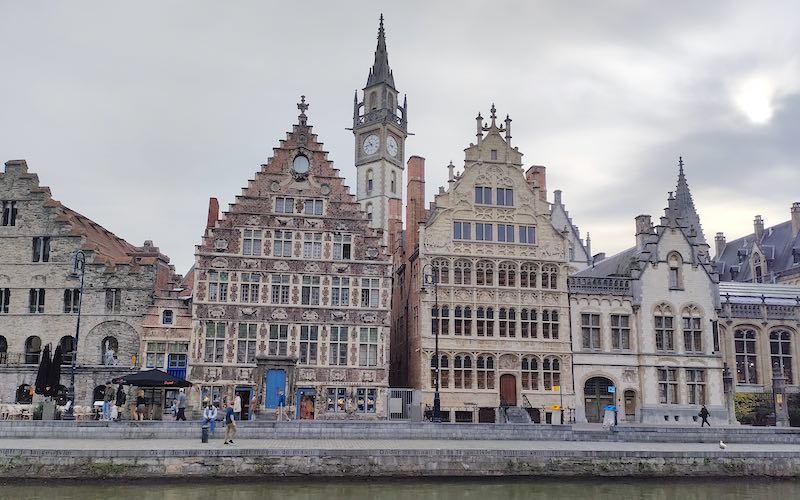
How long do I need to spend in Ghent?
It is possible to see the main sites of Ghent in just one day, and so it is worth doing as a day trip from Bruges or Brussels. If you are interested in this, check out my blog on how to spend one day in Ghent. However, I spent 3 days in Ghent and I recommend more than just a day to enjoy the beautiful city so that you immerse yourself in the culture and do not feel rushed.
The Pros of visiting Ghent
The architecture is the main reason to visit, but as well as that, you have museums, good shopping and great nightlife centred around a beer scene with over 1000 beers to choose from!
Accessible from Brussels Airports
First off, let’s talk about accessibility. Most people fly into Brussels or Charleroi airport. Ghent is accessible from both. The Flibco bus will be able to take you direct from Charleroi to Ghent. If you fly into Brussels, then you can get the train to Ghent which will only take around an hour. When you arrive in Ghent you will probably arrive at Sint Pieters station. You can either walk along the river (which takes around half an hour) or jump on the number 1 tram in the direction of Evergem (cost is €2,50).
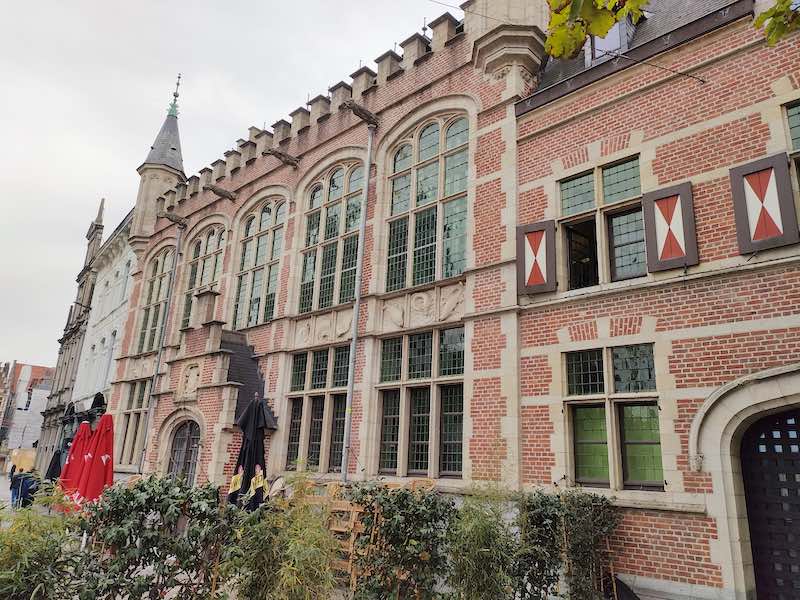
Amazing Medieval Architecture
The architecture is probably the most amazing Medieval architecture that I have ever seen. The view from St Michaels bridge will blow you away! So if you like historical buildings, Ghent is not a city that should be missed. Here are the highlights….
- St Nicholas Church – Impressive medieval Church at Korenmarkt.
- Ghent Belfry – the tallest Belfry in Belgium (pay to go up the tower for amazing views from the top)
- Bavo Cathedral – Stunning Cathedral and pay to go to see the painting the Mystic Lamb at the back left of the Church.
- Riverside with stepped gable houses and the grain tax house.
- Old Orphanage and Apothecary house on Kranlei Street.
- Ghent Town Hall – with two different architectural styles (Gothic and Renaissance).
- Old Markets – The Old Meat Market, Fish Market and Corn market.
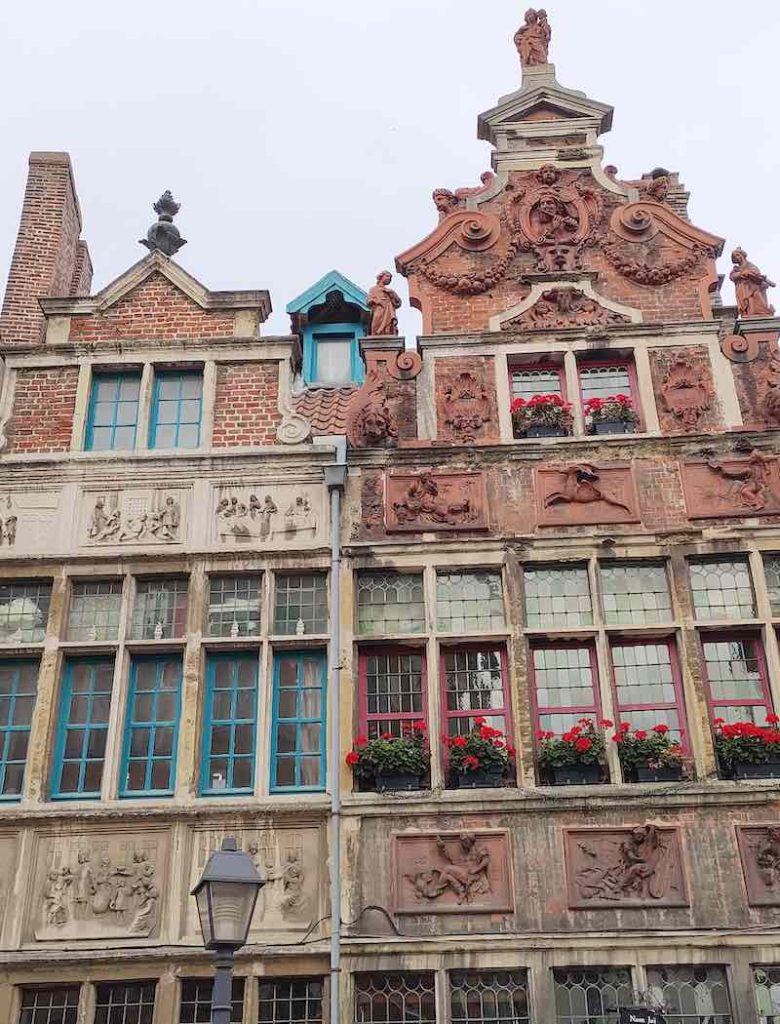
One of the best Food scenes in Europe
Let me tell you now….the Ghent food scene is absolutely amazing. I would recommend that you do a food tour with a local guide. They will tell you which places to eat and how to avoid the tourist traps. Whilst you are in Ghent, there are a few things that you must try….
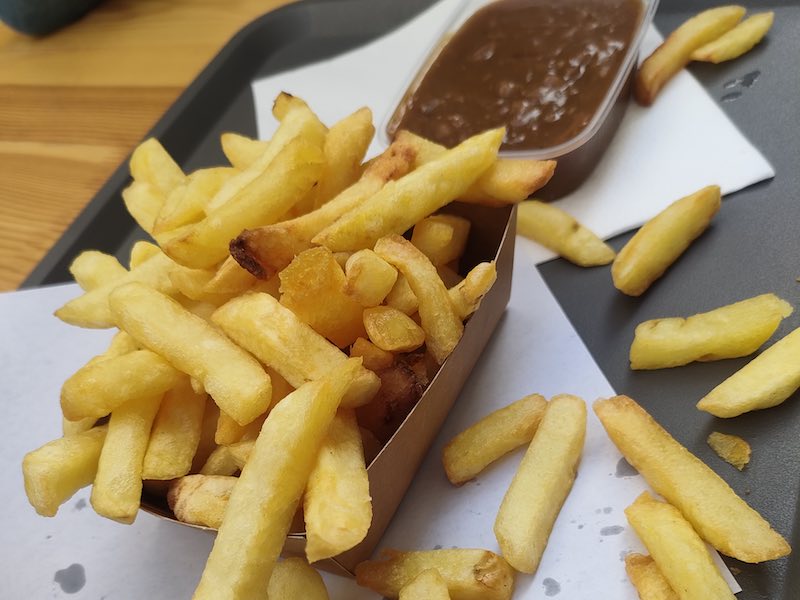
- Belgian fries with Flemish stew – I recommend the Taartar Bar
- Belgian waffles – The two main types are the Brussels (light and fluffy) and Liege (sugary and dense). Get them at The Waffle Factory or Oyya.
- Belgian Chocolates – Go to Sophie’s near Bavo Cathedral (it’s local made, not a chain).
- Cuberdons – These are the sweets that are made from Arabic gum and look like cone or nose shapes. Buy them from the street carts around the city, they have some in front of Gravensteen castle.
- Belgian Beer – You can’t go to Ghent without trying the Belgian beer! Go for a Kwak or an Orval (expect to pay between 4-6€). The best places to try different Belgian beers are Dulle Grit (on Friday Market square) and the Het Waterhuis de Bierkart (riverside bar).
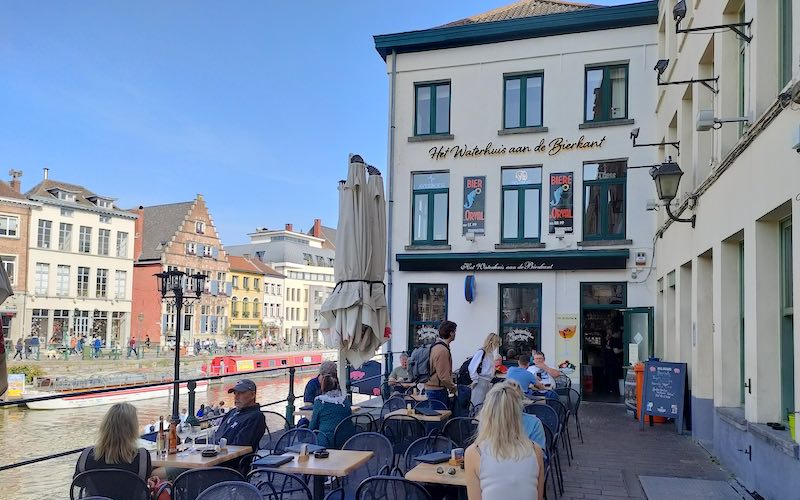
English widely spoken
If you are worrying about the language barrier in Ghent, you honestly don’t need to. Although it is in Flanders and the official language is Dutch, most people in Ghent can and will speak English. Avoid using French in that area – the locals are not a fan!They’d rather speak English than French, which stems back to the Middle Ages when Dutch was a working class language and French was spoken by the bourgeoisie who looked down on the locals.
Day Trips from Ghent
As previously mentioned, Ghent is well positioned for day trips, and if you want to stay put and not constantly move accommodations, then you can choose Ghent and do Bruges and Brussels as day trips. Antwerp is another popular trip that is doable from Ghent in a day.
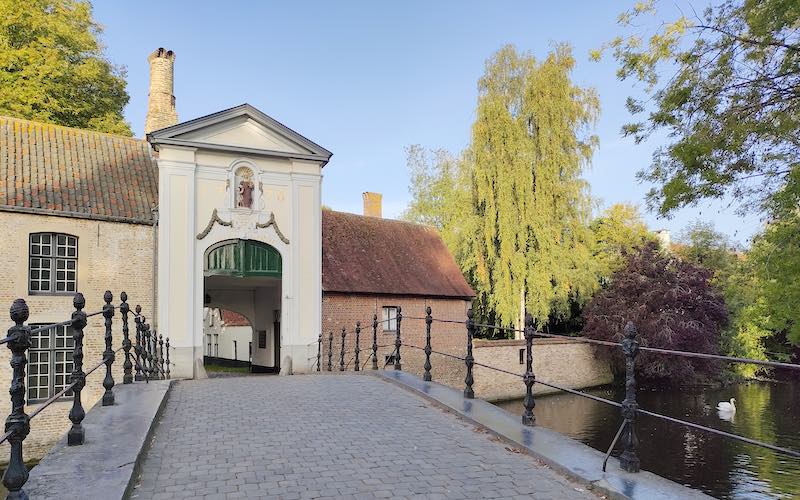
Digital Nomad and Traveller scene
Ghent was a great place to meet other travellers and digital nomads. I met a couple of good people at Hostel Uppelink and also some other solo female travellers on the walking tours, who I went for drinks with after. Ghent is also a student city and so there are lots of International students, which gives the city a really nice global atmosphere. Some digital nomads gravitate towards Ghent rather than Brussels, because accommodation is a little cheaper. Also, Brussels is less than 45 minutes away by train.
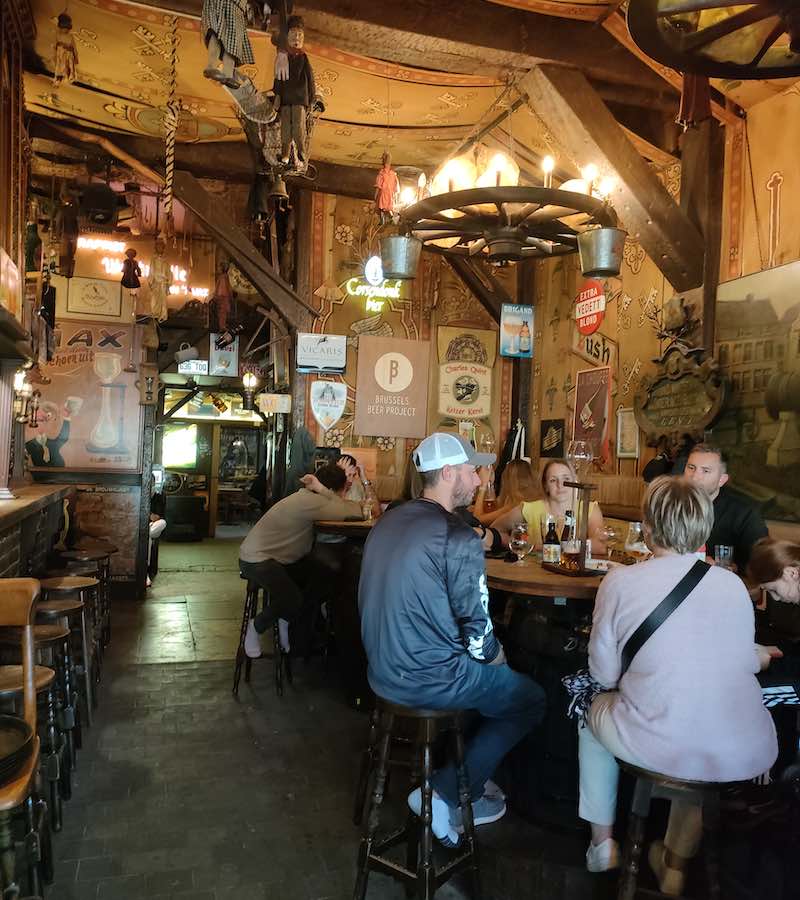
The Cons of Ghent
Ghent is a relatively big city and can be busy, but I didn’t find it as busy as Bruges or Brussels. The biggest challenges are the language (go for Dutch or English) and the cost (it’s not the cheapest part of the world).
Language challenges – which language should I speak?!
Languages can be confusing in Ghent, but you will probably find that most people speak Dutch and very few people speak French. This is a contrast to Brussels which is around 75% French speaking. I’d recommend downloading Duolingo and getting learning some basic Dutch before you go to Ghent or Bruges because they are in the Flanders region. Although it’s not essential, it would be appreciated. As I have mentioned before, most of the locals would rather hear you speak English than French!
Cost – Belgium is an Expensive Part of the World
You need to be prepared for the prices in Belgium as a traveller – it’s not cheap. It is difficult to find meals out for under 20€ but Ghent is one place that I did find this, and so Ghent is cheaper than other Belgian cities such as Bruges or Brussels. But, on average, I was spending 30-40€ a day just on food. That is without the hostel price (approx 35 a night) and entrance to the main attractions or tips for guides.
To see Ghent comfortably, you probably need a budget of around 100-150€ per day. If you want to keep costs down in Ghent, find the student eateries. You can also stay in a hostel (such as Hostel Uppelink) that has kitchen facilities and buy food in the supermarket (Carrefour).
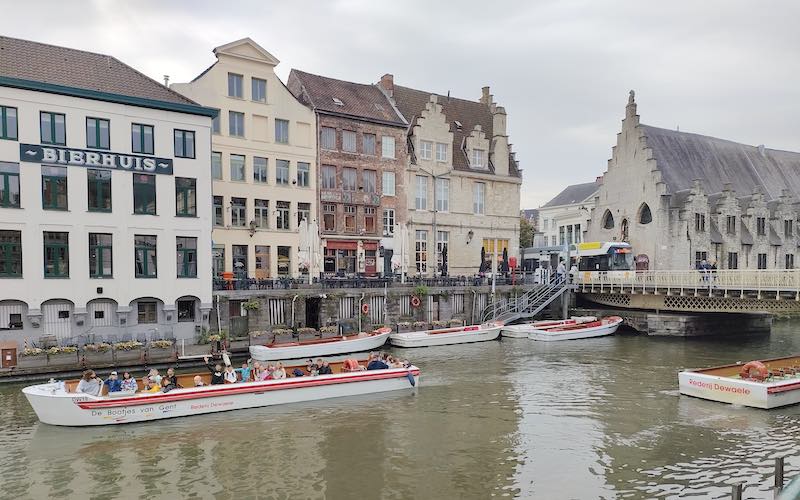
Temperatures can be Chilly in the Winter
In the winter it can be a bit chilly, so think about your timing. The shoulder seasons (March-May and September-October) are probably the best time to go because the weather is warm to mild and it will be less busy. In the winter months of December and January the temperatures drop to just 2 or 3 degrees (Celsius), so personally I would avoid those months, unless of course you are desperate to see Ghent at Christmas time!
Most important Ghent Travel Tips
- To get from the station Ghent Sint-Pieters, take the number 1 tram in the direction of Evergen. It is 2,50€ for a ticket and you can pay by card at one of the machines at the tram stop outside the station.
- Spend at least 2-3 days in Ghent. But, if you are pushed for time it is doable as a day trip because most of the historical centre can be seen on foot in a few hours.
- Join one of the walking tours outside Uppelink Hostel on St Michaels bridge.
- Take a credit or debit card (Visa or Mastercard) as there are some places that don’t accept cash.
- If you are Hostelling take a padlock to lock away your valuables.
- There are paid lockers at Hostel Uppelink that everyone can use to drop a bag while you see the city. It costs 40€ per hour and is payable by card.
- Boat trips and kayaking are a fantastic way to see the city.
- Go to one of the supermarkets such as Carrefour if you want to save money (Belgium is not cheap).
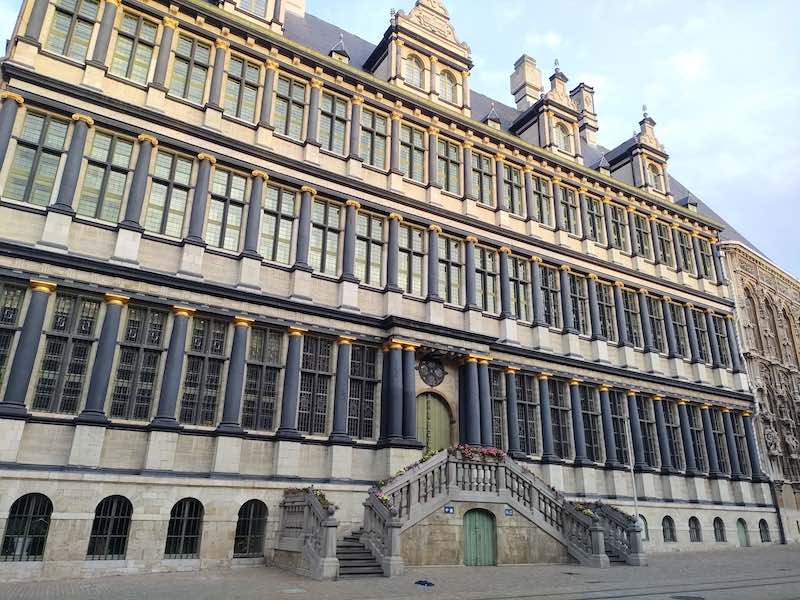
What to pack for Ghent
- Rain Jacket – weather can be unpredictable in the autumn and winter (mine is Regatta – see above).
- Water bottle – to save money on drinks and also avoid dehydration in the summer (mine is SIGG and I highly recommend this brand as they are very durable).
- Walking boots – These are essential for Ghent as there are a lot of valuable walking tours (mine are Karrimor Bodmin weatherlite).
- Credit and Debit cards as well as EUROS in cash (for the odd few tips and toilets!)
- Padlock for your locker if you are staying in hostels – this will help you to keep your belongings secure. I prefer a number code padlock instead of one with a key (so I don’t have to worry about losing the key!)
- Lonely Planet Guide to Belgium and Luxembourg – it’s always nice to have a paperback guide rather than always relying on digital material.
Where to stay in Ghent
- Hostel Uppelink (best budget option) – Well positioned on St Michaels bridge and where all the walking tours go from. A friendly and sociable hostel that offers a breakfast for 6,50€ and free wi-fi throughout. Keys are digital keys that will come through to your smart phone. You can ask for a St. Michael’s Bridge view room, which is definitely worth the extra as it’s only the difference of a couple of EUROS!
- Ibis Gent Centrum St Baafs Kathedraal – Central location and a popular mid-range hotel with wi-fi and a good breakfast.
- Pillows Grand Boutique Hotel Reylof Ghent – Luxury Boutique hotel just 500m from the historical Centre. This high end option boats a bar and lounge (with open fireplace), a wellness pool and a historic garden.
Further Reading on Belgium
If you enjoyed this article on ‘is Ghent worth visiting?’ then you might also like to read the following articles about travel in Belgium.
- Churches in Bruges
- Food in Ghent
- Is Bruges worth visiting?
- Things to do in Ghent
- Things to do in Charleroi
